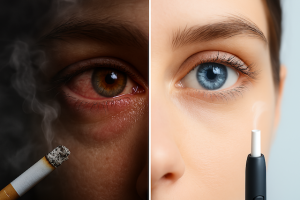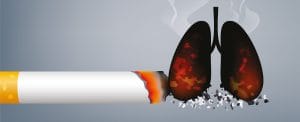CEASEFIRE is the first randomized controlled trial to study effectiveness and tolerability of heated tobacco products as a tool for smoking cessation in a group of 220 smokers not intending to quit. The study, conducted at the University of Catania, provides evidence of a success quit rate of 39.1% for those using heated tobacco products and 30.8% for those using e-cigarettes.
Catania, 6 April 2023 – Dealing with tobacco addiction and the attachment to cigarettes is one of the most difficult challenges for a smoker: psychophysical gratification, daily rituals and gestures of lighting a cigarette make the choice to quit extremely difficult to obtain and, above all, to keep.
Furthermore, relapse rates paint a daunting picture: for unsupported quit attempts, 80% relapse in the first month; rates that drops to 50% for those assisted with specific smoking cessation paths and treatments. Heated tobacco products and new generation electronic cigarettes are an emerging class of products, whose possibilities in the field of support for smokers, especially if they are not motivated to quit, are encouraging: However, doubts about the effectiveness and safety of these tools prevented smokers from taking a definitive step out of addiction, risking their lives and health.
The study “Comparing Effectiveness, tolerability, and Acceptability of Heated Tobacco Products vs. refillable Electronic cigarettes For cigarettes substitution: CEASEFIRE randomized controlled trial” began in 2018 at the Department of Clinical and Experimental Medicine and involved many CoEHAR members. It compared for the first time the effectiveness and tolerability between heated tobacco products and refillable electronic cigarettes, evaluating abstinence rates and reduction in the number of cigarettes smoked within an assisted switching path, based on the experience of harm reduction professionals and on motivational psychological counseling. More than 95% of the participants completed the 12-weeks intervention phase. Successful rates also for the reduction in the number of cigarettes consumed by at least 50% compared to what was declared by the participants at the beginning of the study: 46.4% for the group that used heated tobacco products and 39.3% for e-cigarettes.

“By providing participants with a combined approach of minimal motivational psychological support and innovative yet easy-to-use products, we confirmed for the first time in a randomized trial the efficacy of combustion-free products in helping unmotivated smokers to quit and confirmed 10 years later what our research group had shown with the first study in the world on the efficacy and tolerability of electronic cigarettes, the glorious ECLAT study” – commented the first author of the study, prof. Pasquale Caponnetto, professor of clinical psychology at the Department of Educational Sciences of the University of Catania and CoEHAR member.
The study proves that a positive psychosensory experience, through tools that mimic the gestures and rituals of cigarette smoking and which are pleasant to touch and taste, increases the effectiveness of cessation pathways. Furthermore, a proof of the theory that these tools are valid allies for harm reduction strategies.
“We observed an improvement in exercise tolerance in participants compared to the initial levels: many patients from the first month declared that they have more breath and to feel less fatigue in small but important daily activities such as climbing stairs or doing household” – commented prof. Davide Campagna, researcher of Internal Medicine at the Department of Clinical and Experimental Medicine and CoEHAR member.
THE STUDY
Researchers enrolled 220 smokers who had no intention of quitting cigarettes by randomizing them in two groups, one using heated tobacco products and the other using e-cigarettes, selecting them from a reference sample of adults who smoked more than ten cigarettes a day. On average, participants were 41 years old, mostly men (57.3%), had smoked about a pack daily and with an average of 2 quit attempts in the past. The study lasted for a total of twelve weeks plus a 6-month follow-up (whose data will be published in a later study). Participants could choose one out of 3 different flavours for each class of product. Motivational counselling was offered throughout the study.
Multiple factors contributed to these high success rates, including high-quality products, the assistance offered by cessation and harm reduction professionals, the supply by researchers of appealing and satisfying products, the perception that study products were less harmful than conventional smoking and gestures similar to cigarette smoking. Factors that contributed also to the progressive transition to solos use from dual use (combined use of electronic cigarettes or heated tobacco products and traditional cigarettes), in favor of exclusive use of electronic cigarettes or heated tobacco products and traditional cigarettes alone or no use of any products.
“Data confirm the effectiveness and tolerability of e-cigarettes and the health potential of heated tobacco products for smokers not intending to quit. New publications are in progress” – concluded the principal investigator prof. Maria Signorelli, associated professor of Psychiatry at the Department of Clinical and Experimental Medicine and CoEHAR member.




